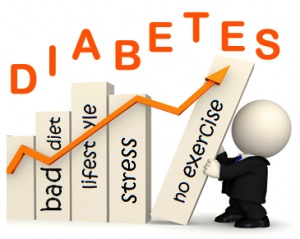Undergraduate perspective on Sports & Exercise Medicine – a BJSM blog series
By Manroy Sahni (@manroysahni)
 A plethora of health benefits are associated with physical activity in Type 1 Diabetes Mellitus (T1DM) (Chimen et al., 2012). Thus, it is important to encourage exercise in T1DM as, just like the general population, the majority of these patients are insufficiently active! (Plotnikoff et al., 2006). T1DM is associated with a 10-fold increase in cardiovascular disease compared to non-diabetics (Laing et al., 2003), therefore the benefits of physical activity in promoting cardiorespiratory health are particularly pertinent in this patient group. However, in this population group we must be mindful of the risks.
A plethora of health benefits are associated with physical activity in Type 1 Diabetes Mellitus (T1DM) (Chimen et al., 2012). Thus, it is important to encourage exercise in T1DM as, just like the general population, the majority of these patients are insufficiently active! (Plotnikoff et al., 2006). T1DM is associated with a 10-fold increase in cardiovascular disease compared to non-diabetics (Laing et al., 2003), therefore the benefits of physical activity in promoting cardiorespiratory health are particularly pertinent in this patient group. However, in this population group we must be mindful of the risks.
Following exercise, people with T1DM will need to replenish their energy levels, correct any hyperglycaemia and guard against low blood sugars. This can be extremely difficult for type 1 diabetics (who may be young) that are trying to keep fit and healthy. Many diabetics worry about hypoglycaemic episodes following exercise. However, with careful monitoring and the right advice these people can excel in whatever sport they choose. This is highlighted by the numerous examples of high profile elite diabetic athletes. Diabetes should not prevent people from exercising. It is the duty of health care professionals to encourage exercise and allow it to be achieved in a safe capacity. Here are some insights from leaders in the feild:
Highlights of the 2nd National Exercise and Type 1 Diabetes (T1DM) Conference
Normal endocrine and metabolic responses to exercise – Professor Anton Wagenmakers
- During high intensity aerobic exercise muscle glycogen is the main fuel whereas at lower intensities the proportion of fat usage increases
- The main metabolic and endocrine regulation mechanisms were also discussed including the roles of insulin, glucagon, cortisol, growth hormone and adrenalin
- A salient message was that improved glucose homeostasis is an immediate benefit for all following exercise
The impact of T1DM on endocrine and metabolic responses to exercise – Professor Michael Riddell
- Type 1 diabetics can do any form of exercise extremely well… but typically have some levels of dysglycaemia
- During exercise type 1 diabetics utilise fuels slightly differently, they tend to be better fat burners and may use more muscle glycogen and less plasma glucose
- A range of factors contribute to the altered blood glucose levels during exercise;
- Type of exercise: High-intensity, short duration, anaerobic exercise such as weight-lifting and sprinting tends to cause hyperglycaemia whereas low-intensity, longer duration aerobic exercise such as jogging predisposes hypoglycaemia
- Nutrition is also a key factor
- The impact of emotions and environmental factors should not be underestimated
Nutrition for patients with T1DM who are exercising – Mrs Janet Gordon
- When exercising the carbohydrate requirements are dependent upon body mass, exercise intensity and duration
- It is essential that people with T1DM receive adequate nutrition before, during and after exercise to prevent hypoglycaemia
- Regarding recovery, protein and carbohydrate together improve glycogen storage post-exercise
Management strategies before and during exercise – Dr Richard Bracken
- It is important to remember that each individual patient will be different and that the same patient may even react differently to the same treatment in different situations.
- Consequently, it is impossible to develop a one-size-fits-all protocol for the management of type 1 diabetic patients undertaking exercise
- Broadly, additional carbohydrate may be required and insulin levels adjusted
For aerobic exercise consider:
- A reduction in rapid-acting insulin before exercise
- Eating low glycaemic index carbohydrates before activity (as recommended by health professional)
For strength/ resistance exercise consider:
- Avoiding an insulin bolus before exercise if it’s a morning session
- Having recovery carbohydrate handy if the session is longer than 30 minutes
- Administering an insulin bolus after the session if it is less than 30 minutes to avoid hyperglycaemia
For further information (Galassetti et al., 2013 AND West et al., 2011)
Post-exercise management – Dr Ian Gallen
- After activity, it is essential to replenish fuel stores, control post-exercise glycaemia and limit late hypoglycaemia
- Fear of hypoglycaemia is the most significant barrier to exercise in type 1 diabetics (Brazeau et al., 2008)
- A hypoglycaemic episode following exercise can have a devastating impact on a type 1 diabetic and it is the role of health care professionals to help prevent this
- Different forms of activity (type, intensity, duration) have different influences on post-exercise blood glucose levels
- Therefore the risk of nocturnal hypoglycaemia varies depending on the form of exercise
- Aerobic exercise later in the day is more likely to cause nocturnal hypoglycaemia than resistance exercise
For further information on the avoidance of nocturnal hypoglycaemia read Taplin et al., 2010.
********************
#Type1uncut is a resource for young adults with T1DM run by Diabetes UK. They provide useful information targeted at young people with diabetes using social media platforms, YouTube and Google+ hangouts. They produce a series of factsheets including information on exercising with T1DM. (Diabetes UK)
Mr. Manroy Sahni (@manroysahni) is a medical student at Birmingham University, UK. He has a keen interest in Sport & Exercise Medicine and is the current Vice-President of the Birmingham Undergraduate SEM Society.
Dr. Liam West (@Liam_West) coordinates the “Undergraduate Perspective on Sports & Exercise Medicine” Blog Series.
If you would like to contribute to the “Undergraduate Perspective on Sports & Exercise Medicine” Blog Series please email LIAMWESTSEM@HOTMAIL.CO.UK for further information.